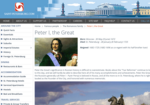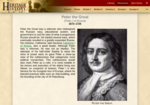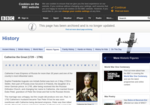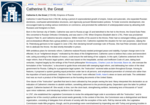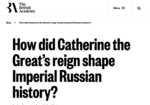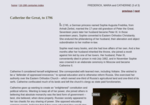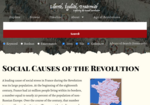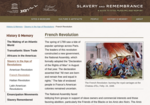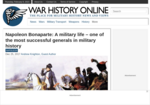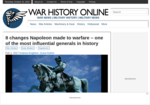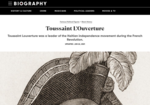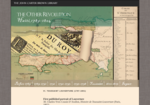Peter the Great
Catherine the Great
French Revolution
Napoleon
Haitian Revolution
Peter the Great was a Russian czar in the late 17th century, who is best known for his extensive reforms in an attempt to establish Russia as a great nation.
Life and history of Peter I of Russia. Read the biographies of Peter the Great and other rulers of Russia in St. Petersburg.
Peter the Great was a reformer who redesigned the Russian navy, educational system, and government to suit his view of what a progressive Russia should be. He started several wars, which eventually resulted in a greatly expanded Russia.
Peter the Great's significance in Russian history is difficult to overestimate. Books about the "Tsar Reformer" continue to be written to this day, and we will hardly be able to describe here all of his many accomplishments and achievements.
Catherine II was Empress of Russia for more than 30 years and one of the country’s most influential rulers.
See the main page for citation information -- http://enlightenment-revolution.org/index.php/Main_Page
Professor Andrew Kahn FBA explores the ways that Catherine the Great impacted Imperial Russian history.
Author is: Frank E. Smitha --- Website name is: Macro-History : World History (no publisher)
There is no single great event that defines Catherine's reign, no epic deed that still excites admiration. Even in her lifetime Catherine had furious critics, who saw her as a bloodstained usurper and opportunist; she also had passionate defenders ... (Indexed on page 92 but on page 114 in Gale viewer) Can be viewed here if unable to find in database -- drive.google.com/file/d/19lZ3213m71MPIfrrb0SGV3MMF6r3wgK5/view?usp=sharing
The French Revolution was a watershed event in world history that began in 1789 and ended in the late 1790s with the ascent of Napoleon Bonaparte.
The Estates began their meeting at Versailles on May 5, 1789 and quickly entered into a power struggle. The Third Estate soon declared itself a "National Assembly" that was representative of the people.
A leading cause of social stress in France during the Revolution was its large population. At the beginning of the eighteenth century, France had 20 million people living within its borders
Bonaparte built upon his image as an enlightened military leader with each increase in his power.
PBS chapters include: The Man and the Myth; Napoleon and Josephine; Politics in Napoleon's Time; Napoleon at War; and more.
Traditionally famous for his military achievements, Napoleon Bonaparte realised early on the importance of public opinion, as well as the influence of institutions in shaping it.
One way in which Napoleon ensured to retain his public image and avoid criticism throughout his reign was by increasing his influence on all written information, starting, of course with the press.
Use the search bar for more articles on this site
"Combining the ideas of the foremost military theorists of his era with the study of the great generals of antiquity [Napoleon] transformed the way the French army fought. His opponents adapted to try to match him."
"Napoleon Bonaparte participated in an important evolutionary period in modern warfare that occurred from about 1760 to 1914 . . . "
"The Battle of Austerlitz is one of the greatest and most-studied battles of history. But great battles are made up of small ones. This paper is an attempt to illustrate the eight Principles of War . . . through the study of one such small one."
François Toussaint L'Ouverture was a former Haitian slave who led the only successful slave revolt in modern history. Standing steadfastly, he fought to end slavery and gain Haiti’s independence from European powers.
As a general, Toussaint led his forces to victory over the planter class—and thousands of invading French troops. But that was only the start. Navigating the complex, ever-shifting politics of dueling colonial powers, he successfully repelled the aggressions of Europe’s mightiest nations.
Few historical figures can have made their introduction to the public sphere in quite so stylish a manner as Toussaint Louverture
SEARCH ~ "Louverture" site:https://slaveryandremembrance.org/articles/ ~ to find pages where he is mentioned and CTRL F on those pages for specific references. "By 1793, he had added “Louverture” (French for “opening”) to his name, presumably for his skill in finding or creating openings in enemy lines."
On the morning of 7 April 1803, Toussaint Louverture, leader of the slave insurrection in French Saint-Domingue that led to the Haitian Revolution, was found dead by a guard in the prison in France where he had been held captive for nearly eight months.
Each image here links to the actual primary source document in the original French. Documents can be located in translated form in other primary source resources.
Describes the role of numerous individuals involved in the Abolition movement and eventual end to Slave Trade in Great Britain and it's colonies. "The campaign to end slavery [in Haiti] coincided with the uprisings of the French Revolution and the retaliation of enslaved communities in the British colonies."

